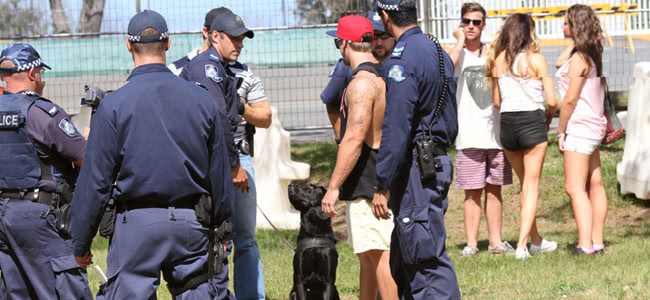Like it or loath it, drugs have become a huge part of the Australian Music Festival scene, but Australian Police are taking even more extreme measures to close a legal loophole that allows revellers caught smuggling drug into music events to continue with the festivities.
The Australian Police have many tactics in their arsenal to catch chemically affected festival-goers, which include sniffer dogs and large quantities of officers patrolling music events. Over the Labour Day long weekend, Police with sniffer dogs arrested over 200 punters at events like Future Music Festival, Tasmania’s Breath of Life Festival, and the Port Fairy Music Festival. Additionally, according to the Herald Sun, in this festival season alone, police have caught 420 pill poppers and drug takers since December.
Now, Australian Police are taking a stance on the increase of drug users at music festivals, keen to inflict a dismissal of any punters having consumed or distributed drugs by holding discussions with event organisers to introduce a condition of entry that prohibits drugs.
Victoria Police Superintendent Peter O’Neill states that emergency talks will be held to ensure that the festival will end for those revellers caught with drugs. He comments that “It should be a condition on their ticket that they will be refused entry if caught with drugs, and we want their tickets withdrawn.”
“It’s a strategy that definitely needs to be in place and we will talk to them (event organisers) about it,” he told the Herald Sun.
Currently, offenders caught with illicit substances receive a diversion order to attend a mandatory appointment after the event, but have no power to prevent drug-smugglers for entering festival grounds, even after being caught. Supt O’Neill said that the diversion orders “have the desired effect to stop people re-offending… If you save one life you are doing a good job.”“It should be a condition on their ticket that they will be refused entry if caught with drugs, and we want their tickets withdrawn.” – Peter O’Neill, Victoria Police
But authorities are keen to prevent the distribution and consumption of drugs at festivals, which is becoming more increasingly difficult to police. Partly, because they are currently powerless to stop drug offenders from attending the events, hoping that a new Condition Of Entry stating that wrongdoers must vacate the festival if caught with illegal narcotics will help their efforts.
Big name festivals such as Summadayze, Parklife, Soundwave, Future Music and the Big Day Out all see a huge number of drugs carried through the gates, such as cocaine, speed, ecstasy, GHB, marijuana, LSD, magic mushrooms and ice. As festivals get bigger and increase popularity, so do the number of ticket holders attempting to sneak in narcotics.
A Condition Of Entry could increase the inherent risk of self-harm of those festival attendees looking to consumer drugs ahead of the event, which can be a lethal decision leading to potential overdose.
Nobody wants a repeat of the 2009 Perth Big Day Out Festival, where a young girl panicked at the gates and consumed a handful of ecstasy tablets before entering the event. As previously reported, Gemma Thoms consumed three ecstasy pills before entering the Big Day Out, afraid of the consequences of being caught in possession of drugs by police and sniffer dogs; the then-17 year old later collapsed at the festival and was taken to hospital where she died the next day.
A coroners inquest recently ruled Thoms death as accidental, and in no way the fault of the Festival Medical Staff or organisers. However if there are harsher penalties for attendees caught with drugs at festivals, there is the potential for further accidents like this to occur.
Besides the inherent risks of an introduced condition of entry, the new policy won’t do much good for festivals, which are already struggling to bring in large crowds in an increasingly competitive market.
Festival promoters are having enough trouble as it is selling tickets these days, struggling to keep crowds happy with lineups drenched in big name Australian and International acts. Currently the average price of a festival ticket is $150, and in recent years the number of ticket buyers appear to be dwindling.
The 2012 Ticket Attendance & Revenue Survey demonstrated that music festivals experienced a 4.4% decline in gross takings, down to $96.45 million from 2010′s figure of $100.92 million, while attendance also experienced a drop, falling by 4.2%, across even the largest Australian festivals like Splendour In The Grass, Future Music and the Big Day Out.
Potentially, festival organisers may not take to the idea of introducing a new condition of entry if it harms the potential sale of tickets. Out of the huge number of tickets sold for these events, a large majority of these ticket holders will attempt to augment their festival celebrations with drugs, a risk of not even being allowed in could affect their purchasing decisions.
For events that have decreasing ticket sales as it is, the dramatic new policy – if introduced – has the potential to turn away huge quantities of fans; a success for Police, yet a huge turn-off for revellers due to the increased risk of being caught.
It would not come as a surprise if event promoters did not jump on the Police bandwagon with this issue. Although never condoning the use of drugs or intoxication of alcohol, their business is to sell tickets to a great event, and this new policy puts the already decaying ticket sales in jeopardy.

































